Featured Topics
Featured Products
Events
S&P Global Offerings
Featured Topics
Featured Products
Events
S&P Global Offerings
Featured Topics
Featured Products
Events
S&P Global Offerings
Featured Topics
Featured Products
Events
Language
Featured Products
Ratings & Benchmarks
By Topic
Market Insights
About S&P Global
Corporate Responsibility
Culture & Engagement
Featured Products
Ratings & Benchmarks
By Topic
Market Insights
About S&P Global
Corporate Responsibility
Culture & Engagement
S&P Global — 20 Jun, 2023 — Global
By S&P Global
Start every business day with our analyses of the most pressing developments affecting markets today, alongside a curated selection of our latest and most important insights on the global economy.
Dangote Refinery to Reshape West Africa’s Crude and Fuel Flows
Nigeria is the biggest crude producer in Africa, yet it is largely import-dependent when it comes to refined petroleum products. The country’s energy market has also been plagued by theft and pipeline sabotage for years, leading many to believe that its oil riches have been more of a curse than a blessing. The highly anticipated Dangote oil refinery near Lagos promises to turn Nigeria’s fortunes around by making the country self-sufficient in fuel, with the potential to reshape crude and fuel flows in West Africa and worldwide.
Named after Nigerian billionaire Aliko Dangote, the $18.5 billion refinery has officially opened its doors. The landmark project was commissioned by outgoing Nigerian President Muhammadu Buhari on May 22, almost a decade after it was proposed in 2014, having faced repeated delays and cost overruns.
Although rich in oil, Nigeria exports most of its crude; nearly none gets processed domestically due to poor refining capacity. This has forced the country to import most of its refined products, from gasoline and diesel to jet fuel and liquefied petroleum gas. To help consumers pay for fuel imported mainly from Europe, Nigeria has a long-standing policy to subsidize the costs, a move that has been “very expensive for the government,” gasoline editor Matthew Tracey-Cook said in an episode of S&P Global Commodity Insights' “Platts Oil Markets” podcast. Nigeria's new president, Bola Tinubu, announced that the fuel subsidy will soon be scrapped because of budget constraints.
Nigeria’s reliance on fuel imports has “put a massive weight on the country’s foreign exchange reserves, naira currency and economy,” oil news reporter Charlie Mitchell said on the podcast. These issues are expected to be resolved as the Dangote refinery comes online. The refinery is touted to have the potential to “create a multibillion-dollar domestic market for Nigerian crude, bolster foreign exchange reserves, supply more affordable fuel domestically and boost downstream investment,” Tracey-Cook and Mitchell wrote in a report.
The plant aims to meet all of Nigeria’s refined product demand before the end of 2023. "Our first goal is to ramp up production of the various products to ensure that within this year, we are able to fully satisfy the nation's demand for quality products," Dangote said at the project’s commissioning in May.
Beyond Nigeria, the plant is expected to reshape the flow of refined products in West Africa and the Atlantic basin with its planned production of Euro V-quality gasoline and diesel, as well as jet fuel and polypropylene. "Forty percent of our plant capacity will be for export," Dangote said. The facility looks to supply refined products to other African countries importing from the US and Europe, and potentially to South Africa and Latin America.
The refinery is also set to transform crude flows in West Africa, given its capacity to process 650,000 barrels per day. Most of the crude for the plant will be supplied from Nigeria, including about 300,000 b/d from the Nigerian National Petroleum Corp., which has acquired a 20% stake in the project. Nigeria is already pumping oil well below its capacity of 2.5 million b/d because of theft, lack of investment, and technical and operational issues. This means the country will have to halve its crude exports, diminishing foreign exchange earnings, FBNQuest analyst Uwadiae Osadiaye told S&P Global.
The facility will likely need to source more crude from Angola, Chad and other nearby producers. It can process a variety of crudes, "including many of the African crudes, some of the Middle Eastern crudes, and the US light tight oil," according to its fact sheet.
These promising prospects notwithstanding, questions remain as to whether the refinery can ramp up output within projected timelines and whether Nigeria can export refined products over long distances. "Dangote has huge potential ... I just do not know how they will handle it. Logistics might be tough on them to maximize the results," a trader told S&P Global.
Today is Thursday, June 22, 2023, and here is today’s essential intelligence.
Written by Pam Rosacia.
Stimulus Is A Highwire Act For China's City Governments Facing Property Go-Slow
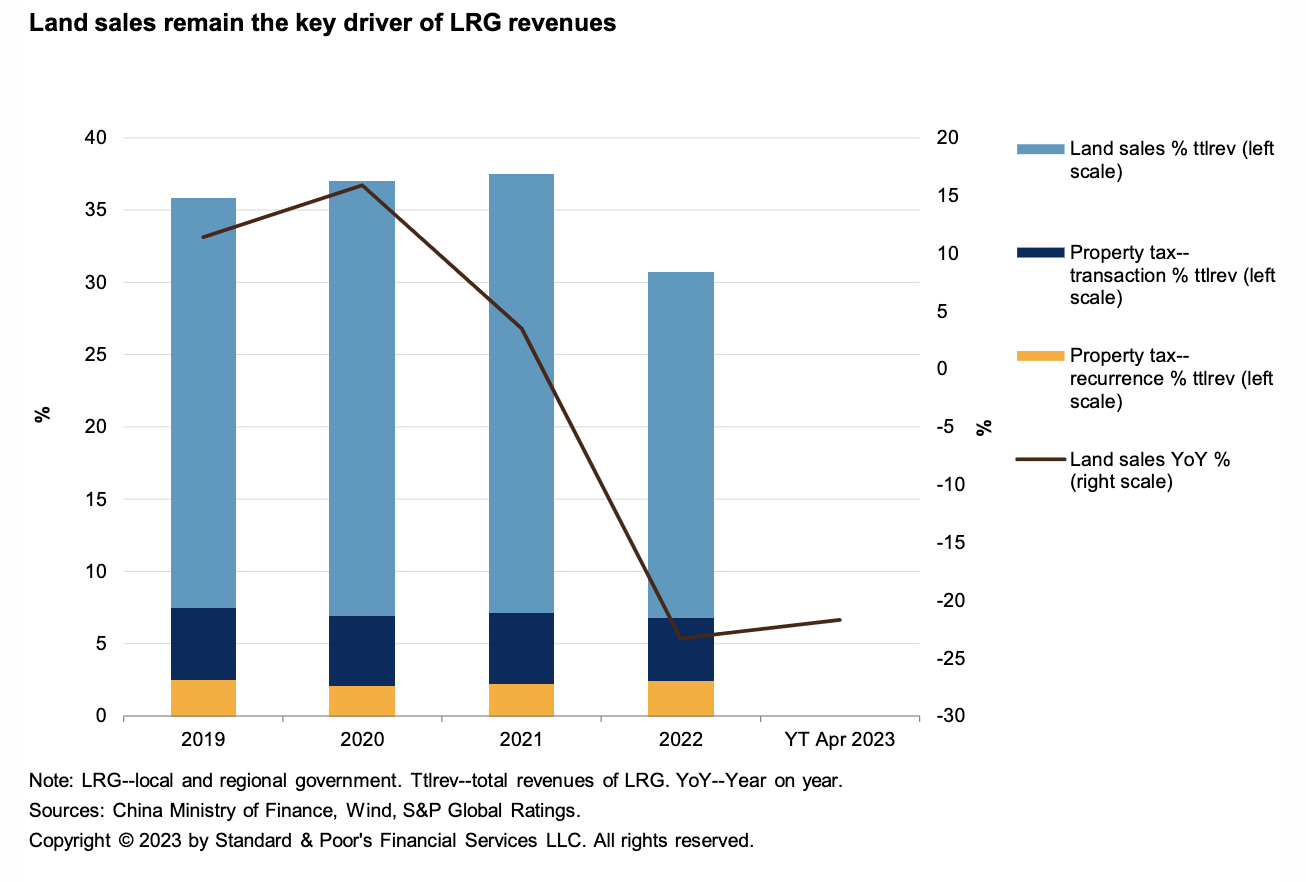
China's sluggish property market presents a lingering headache. The pain is acute for the local and regional governments (LRGs) that rely on property sales. The central government is in a bind, too, for its economic recovery hinges on policy planning and execution by the LRGs. The governments will struggle to achieve fiscal consolidation as long as investment-driven stimulus remains the chief means of spurring local development.
—Read the report from S&P Global Ratings
Access more insights on the global economy >
Cash Ratios Dip Further In Q1 For Companies With Weak Credit Ratings

The cash ratios of non-investment grade-rated companies were squeezed further in the first three months of 2023. The median measure of cash and equivalents as a share of total liabilities of companies rated lower than BBB- by S&P Global Ratings fell to 36.3% in the first quarter, from 40.1% at the end of 2022, with declines in seven of the 11 sectors, according to the latest S&P Global Market Intelligence data.
—Read the article from S&P Global Market Intelligence
Access more insights on capital markets >
Oil Quota Losses Lead African OPEC Members To Reassess Strategy
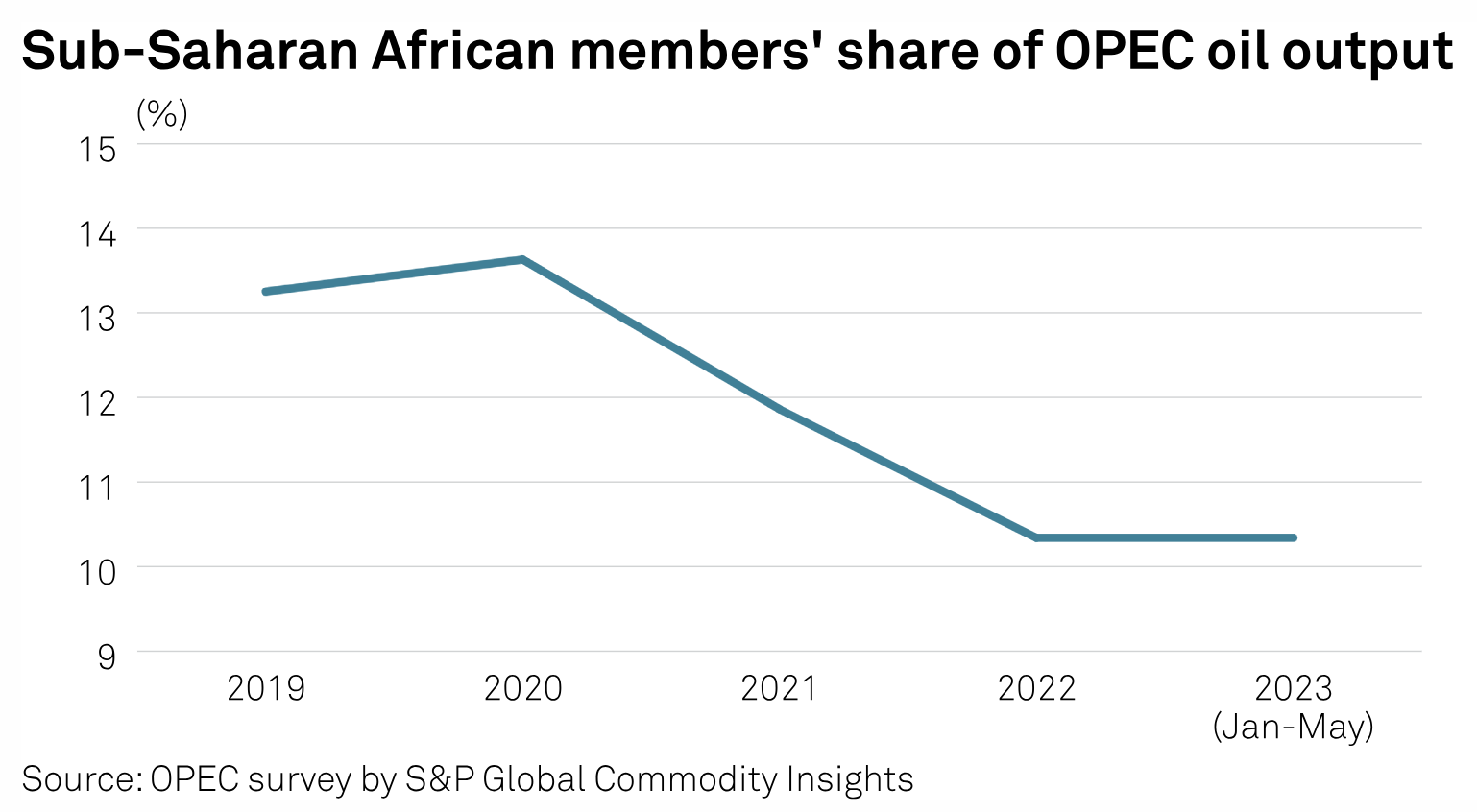
Their hand weakened by slumping crude output, Africa's OPEC members were strong-armed into accepting lower quotas when the bloc and its allies last convened in Vienna, but say they are prepared to fight for their market share within the Saudi-dominated group. They plan to come better prepared for future talks with pre-agreed strategies and a unified front — taking a page from their Middle East counterparts, who typically align their positions before contentious negotiations through pre-meeting consultations — people familiar with the situation told S&P Global Commodity Insights.
—Read the article from S&P Global Commodity Insights
Access more insights on global trade >
Sustainability Within The Modern Commodity Allocation – The S&P GSCI Light Energy Climate Aware Is Launched
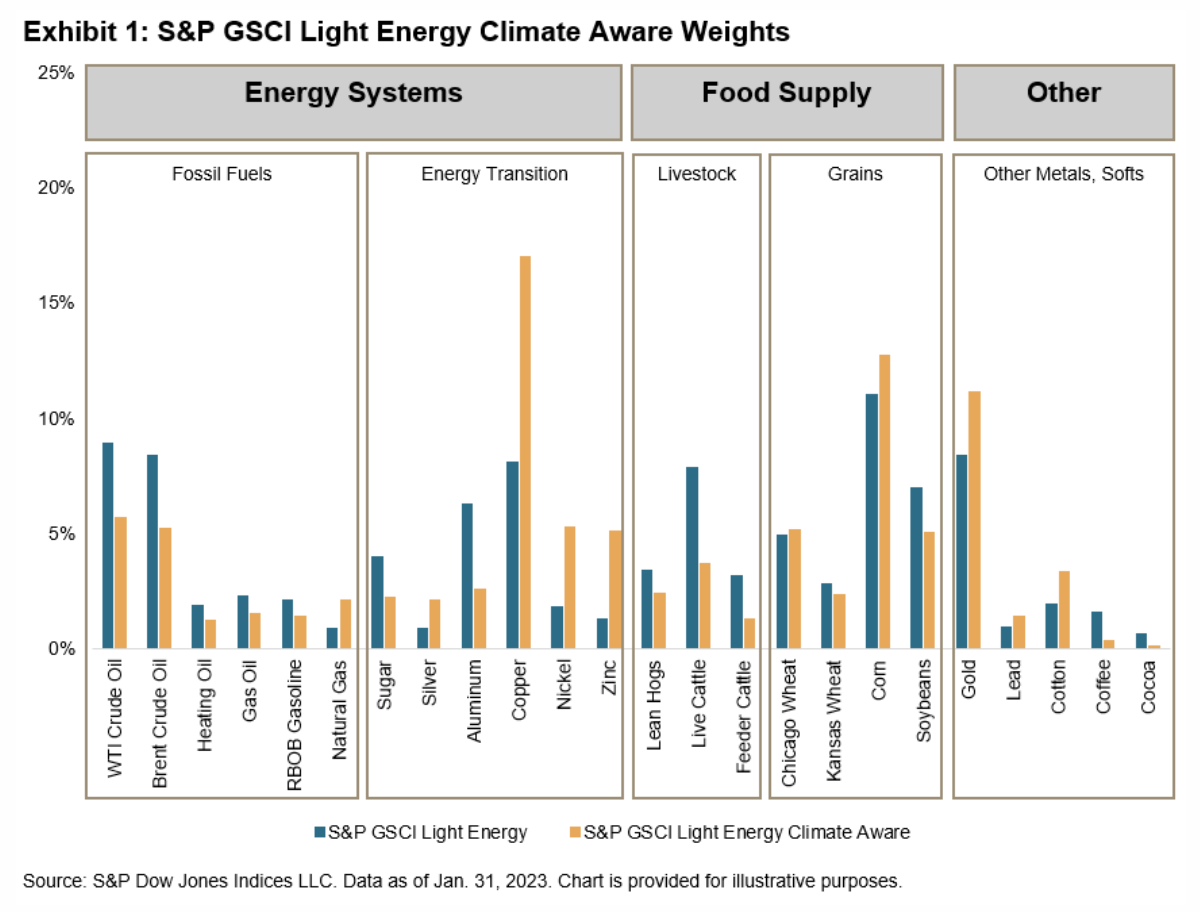
After extensive market outreach, S&P Dow Jones Indices launched the S&P GSCI Light Energy Climate Aware to satisfy a need for a benchmark tied to sustainability and the energy transition, but with a lighter energy weighting than the new S&P GSCI Climate Aware. As can be seen in Exhibit 1, the S&P GSCI Light Energy Climate Aware applies the S&P Global Sustainable1 Commodity Environmental Dataset to the popular S&P GSCI Light Energy in order to provide a commodities benchmark with a 25% lower environmental impact per dollar invested, which provides market participants a commodities overlay within a sustainable strategy. The index has lower weights to fossil fuel commodities while boosting the weights of less environmentally intense commodities tied to the energy transition.
—Read the article from S&P Dow Jones Indices
Access more insights on sustainability >
US EPA ‘Lowers Ambitions’ To Chagrin Of Biofuel Producers In Final RFS Rule For 2023-2025
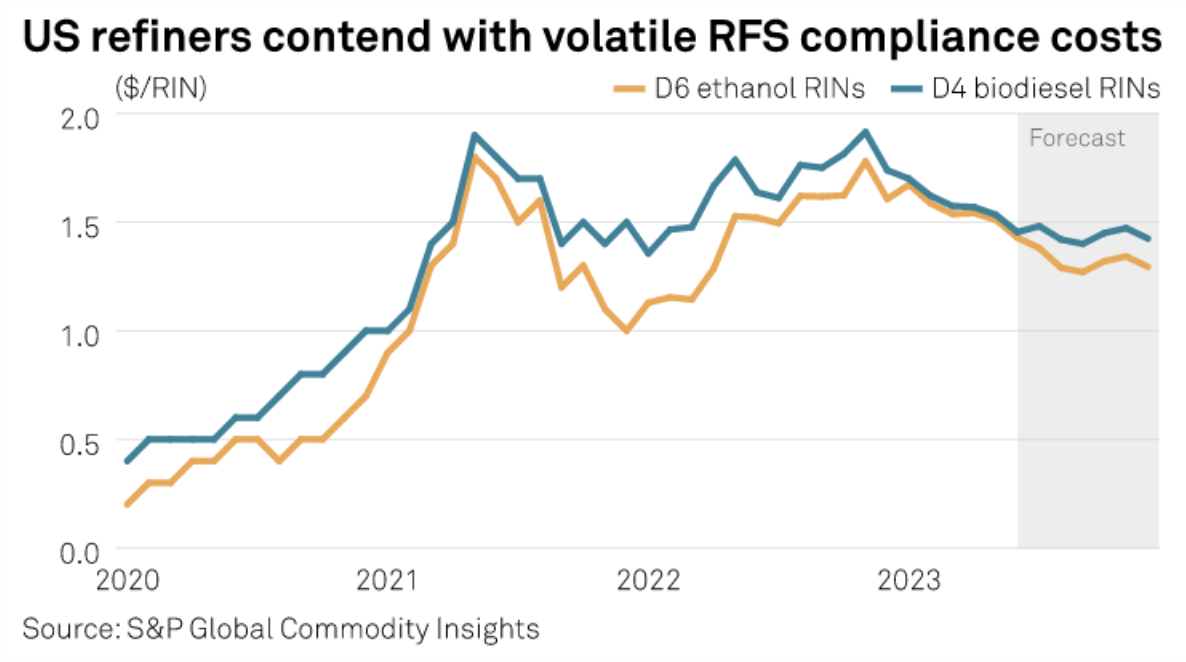
The US Environmental Protection Agency June 21 finalized regulations to steadily raise the amount of renewable fuel that US refiners must annually mix with gasoline and diesel over the next three years, lowering some blending requirements below its December proposal following comments from stakeholders. The new rule tied to the EPA's Renewable Fuel Standard program left the biofuel and farming community deeply disappointed as it pulled back on conventional biofuel blending targets, but it also failed to appease the oil lobby which maintained that the targets were still unachievable.
—Read the article from S&P Global Commodity Insights
Access more insights on energy and commodities >
June Auto Inventory Trends You Should Know
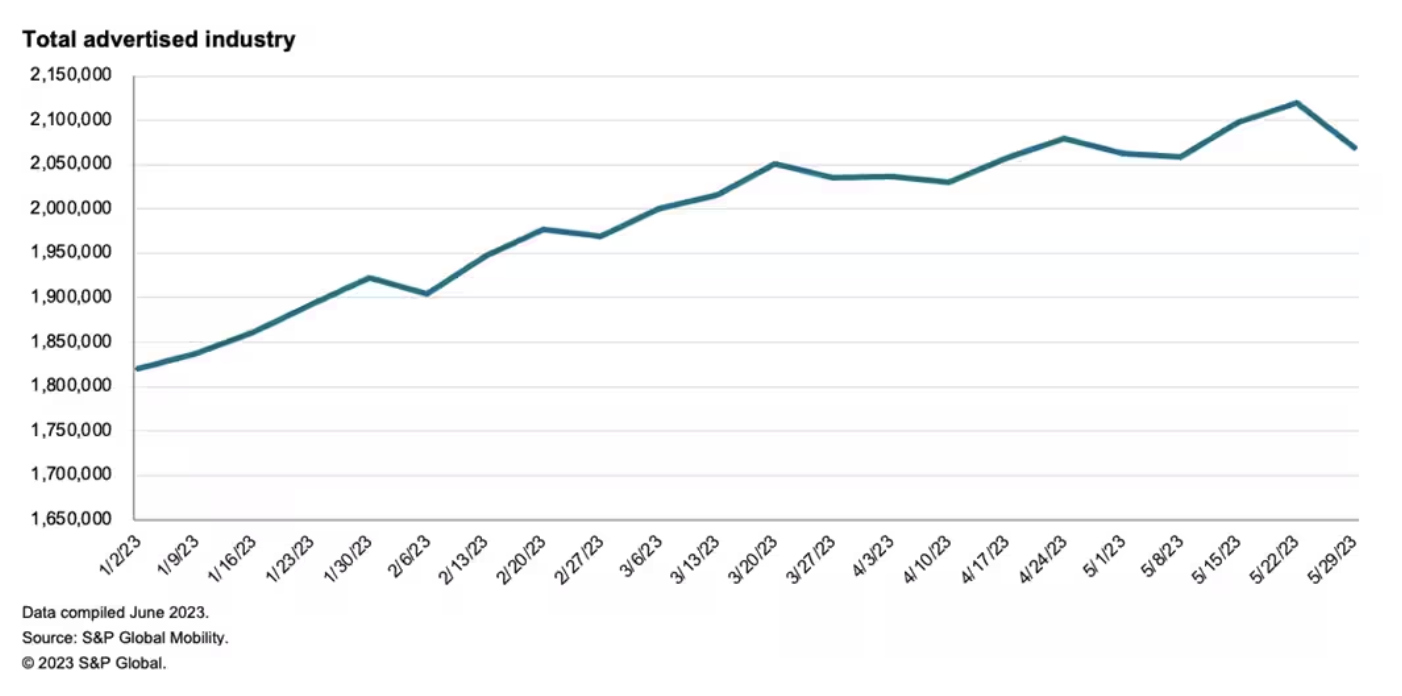
While dealer-advertised vehicle inventories continue their several-month trend of meandering around 2.050 million vehicles — though a startling 72% increase year-over-year — there are some discernable recent inventory trends based on S&P Global Mobility's data. While many brands continue to struggle to keep dealers supplied, others are seeing relief for the first time since the pandemic.
—Read the article from S&P Dow Jones Indices
Content Type
Theme
Segment
Language
